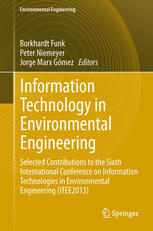

Most ebook files are in PDF format, so you can easily read them using various software such as Foxit Reader or directly on the Google Chrome browser.
Some ebook files are released by publishers in other formats such as .awz, .mobi, .epub, .fb2, etc. You may need to install specific software to read these formats on mobile/PC, such as Calibre.
Please read the tutorial at this link: https://ebookbell.com/faq
We offer FREE conversion to the popular formats you request; however, this may take some time. Therefore, right after payment, please email us, and we will try to provide the service as quickly as possible.
For some exceptional file formats or broken links (if any), please refrain from opening any disputes. Instead, email us first, and we will try to assist within a maximum of 6 hours.
EbookBell Team

5.0
100 reviewsInformation technologies have evolved to an enabling science for natural resource management and conservation, environmental engineering, scientific simulation and integrated assessment studies. Computing plays a significant role in the every day practices of environmental engineers, natural scientists, economists, and social scientists. The complexity of natural phenomena requires interdisciplinary approaches, where computing science offers the infrastructure for environmental data collection and management, scientific simulations, decision support, documentation and reporting. Ecology, environmental engineering and natural resource management comprise an excellent real-world testbed for IT system demonstration, while presenting new challenges for computer science. Complexity, uncertainty and scaling issues of natural systems constitute a demanding application domain for modelling, simulation and scientific workflows, data management and reporting, decision support and intelligent systems, distributed computing environments, geographical information systems, heterogeneous systems integration, software engineering, accounting systems, control systems, as well as sustainable manufacturing and reverse logistics. This books offers a collection of papers presented at the 6th International Conference on Environmental Engineering, held in July 2013, in Lüneburg, Germany. Recent success stories in ecoinformatics, promising ideas and new challenges are discussed among computer scientists, environmental engineers, industrial engineers, economists and social scientists, demonstrating new paradigms for problem solving and decision making.